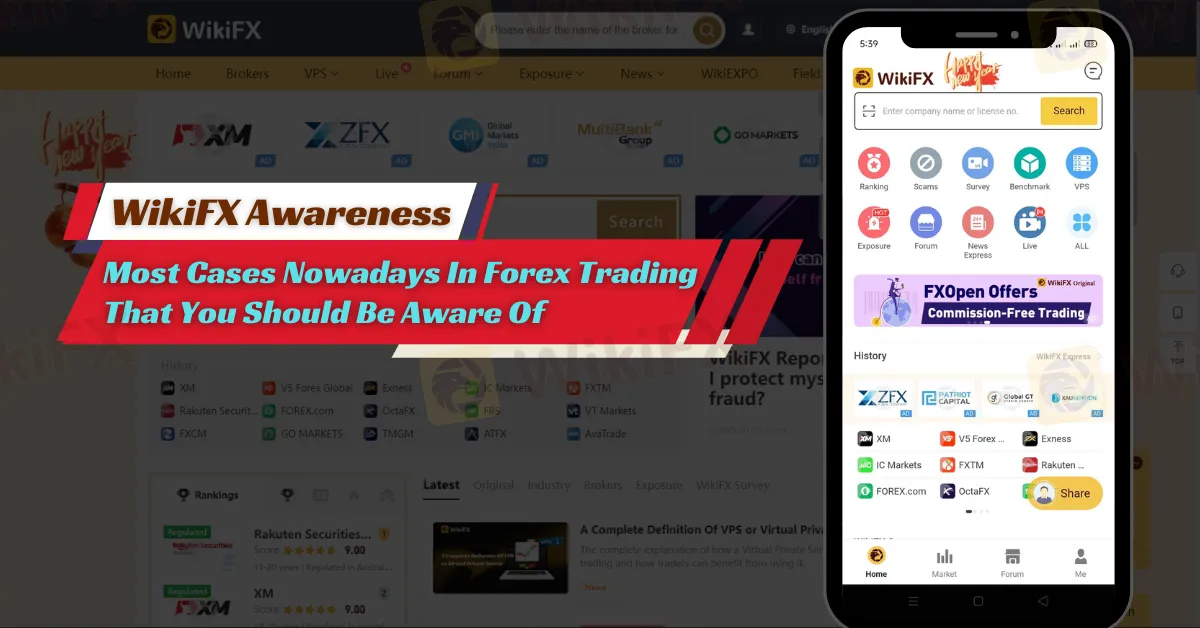简体中文
繁體中文
English
Pусский
日本語
ภาษาไทย
Tiếng Việt
Bahasa Indonesia
Español
हिन्दी
Filippiiniläinen
Français
Deutsch
Português
Türkçe
한국어
العربية
WikiFX Awareness: Most Cases Nowadays In Forex Trading That You Should Be Aware Of
Abstract:A brief explanation of unauthorized brokers who were warned by a certain regulatory authority that they would most likely resume operations under a different name.

Unauthorized brokers are individuals or companies that are not licensed or regulated by a regulatory authority. They may be operating illegally or may not have the proper credentials to provide financial services. A regulatory authority, such as the Securities and Exchange Commission (SEC), the Commodity Futures Trading Commission (CFTC), or the Financial Conduct Authority (FCA), may issue warnings or take action against these brokers to protect consumers from fraud or other financial harm. However, it is possible that these unauthorized brokers may continue to operate by using different names or by moving to different jurisdictions, making it difficult for consumers to identify and avoid them. It is important for individuals to conduct due diligence and research any potential broker or financial advisor before investing any money with them.
What are the most important things to do to prevent this from happening?
There are several important steps you can take to avoid falling victim to an unauthorized broker:
Verify the broker's credentials: Always check to see if a broker is registered and licensed with a regulatory authority. You can do this by checking the SEC's Investor.gov website or the National Futures Association's (NFA) Background Affiliation Status Information Center (BASIC).
Research the broker's background: Look for any red flags in the broker's background, such as a history of customer complaints or regulatory actions. You can also check the broker's record with the Financial Industry Regulatory Authority (FINRA) or the NFA.
Investigate the broker's references: Contact the broker's references and ask about their experiences. Be wary of any broker who is unwilling to provide references or who only provides you with positive testimonials.
Be skeptical of unsolicited offers: Be wary of unsolicited offers of investment opportunities, especially if they come from an unfamiliar source. These may be attempts to scam you out of your money.
Be cautious of high-pressure tactics: Be cautious of any broker who uses high-pressure tactics to persuade you to invest, such as insisting that you make a decision quickly or threatening that the opportunity will disappear if you don't act fast.
Avoid offshore brokerages: Be particularly careful of offshore brokerages, which may be operating outside of the jurisdiction of regulatory authorities.
By doing these things, you have a better chance of not getting scammed by an unlicensed broker.
Use the WikiFX App more frequently to avoid falling victim to fraudulent brokers, or contact the WikiFX Support team for assistance in locating a suitable broker.

Disclaimer:
The views in this article only represent the author's personal views, and do not constitute investment advice on this platform. This platform does not guarantee the accuracy, completeness and timeliness of the information in the article, and will not be liable for any loss caused by the use of or reliance on the information in the article.
Read more

Doo Financial Expands Reach with Indonesian Regulatory Licenses
PT. Doo Financial Futures, a subsidiary of the global financial services brand Doo Group, has secured regulatory approval from Indonesia’s Badan Pengawas Perdagangan Berjangka Komoditi (BAPPEBTI).

Investment Scams in Malaysia: Telegram Tops Scammers’ List
In the first 11 months of 2024, Malaysia recorded 5,685 investment scams, with Telegram emerging as the most commonly used platform for fraudulent activities.

What Are The Common Types of Unregulated Forex Brokers?
Protect your investments from unregulated forex brokers with these tips. Learn about red flags, scams, and how the WikiFX app ensures safe trading experiences worldwide.

CySEC Launches Redesigned Website Packed with New Features
CySEC unveils a redesigned website with advanced search tools, centralized resources, and a news section, enhancing accessibility, transparency, and user experience.
WikiFX Broker
Latest News
Spotware Unveils cTrader Store, Global Marketplace for Algo Creators
Elderly Trader Loses RM2.1M in WhatsApp Forex Scam
Gigamax Scam: Tracking Key Suspects in RM7 Million Crypto Fraud
Singaporean Arrested in Thailand for 22.4 Million Baht Crypto Scam
Trader Turns $27 Into $52M With PEPE Coin, Breaking Records
ASIC Sues HSBC Australia Over $23M Scam Failures
WikiFX Review: Is IQ Option trustworthy?
CFI Partners with MI Cape Town, Cricket Team
Understanding the Impact of Interest Rate Changes on Forex Markets
FCA Seeks Input to Shape UK Crypto Market Regulations
Currency Calculator



